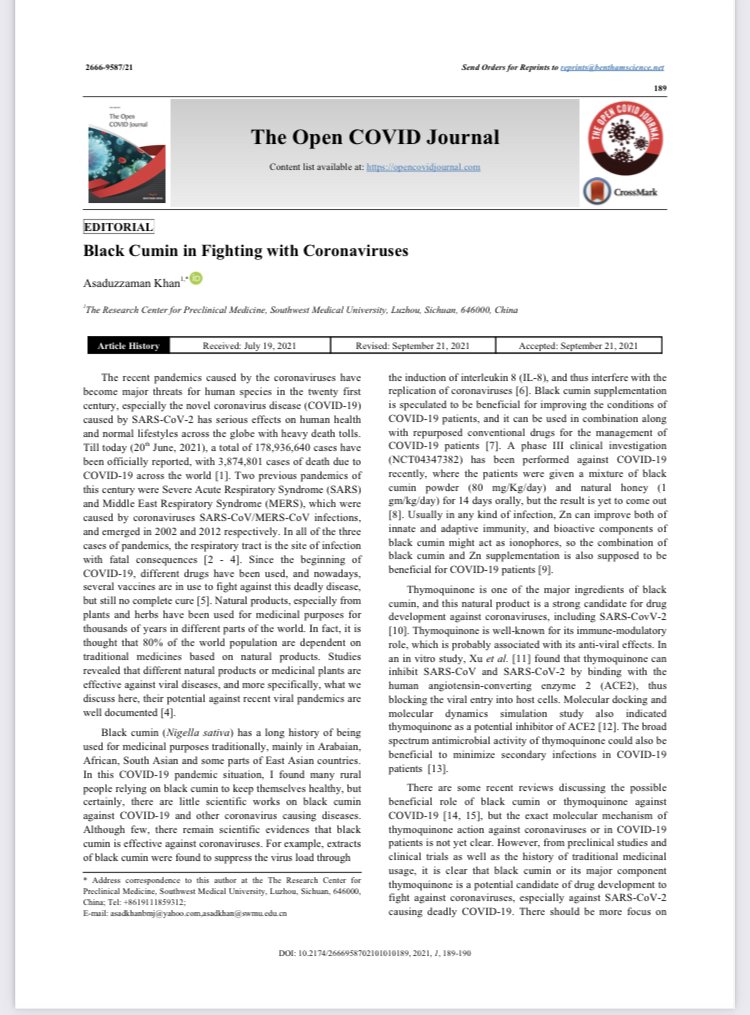3/15/2021
(Note: FLCCC ALLIANCE recommends black cumin seed if ivermectin is unavailable. See EARLY COVID CARE pinned to top of this category.)

Patients were placed into four groups: mild to moderate cases with placebo, mild to moderate cases with honey and nigella (HNS – honey w/ black cumin seed), severe cases with placebo, and severe cases with HNS. Mild to moderate cases were defined as having cough, fever, sore throat, nasal congestion, malaise, and/or shortness of breath. Severe cases were defined as having fever and/or cough along with pneumonia, severe dyspnea, respiratory distress, tachypnea (> 30 breaths/min), or hypoxia (SpO2 < 90% on room air). HNS groups received 1 g of honey mixed with 80 mg nigella seeds per kg body weight orally in two to three divided doses per day for up to 13 days. The placebo group received an empty capsule. Each patient also received the standard care therapy for COVID-19, which comprised of anti-pyretic drugs, antibiotics, supplemental oxygen, and mechanical ventilation, as needed.
Clinical grading scores were recorded for patients on day 0, 4, 6, 8, 10, and 12 and were ranked between 1 (no hospitalization and able to resume normal activities) and 7 (death). Body temperature and serum C-reactive protein (CRP) was also measured. If a patient was asymptomatic for 48 h, they underwent a second SARS-CoV-2 test. If the test was negative, they were considered cleared, and treatment was stopped. If the test was positive, a third test was performed on day 14.
During the study, 2,523 patients were tested for SARS-CoV-2 using the nasopharyngeal swabs, and 1,046 tested positive. Of those 1,046, 210 met the moderate inclusion criteria, and 103 met the severe inclusion criteria. Each group was randomly assigned to HNS or placebo. In the moderate group, 103 were in the placebo group, and 107 were in the HNS group. In the severe group, 53 were in the placebo group, and 50 were in the HNS group.
In the moderate group, alleviation of symptoms happened within four days for the HNS group compared to seven days for the placebo group (P < 0.0001). On day 8, 98.13% of patients were asymptomatic compared to 56.31% in the placebo group. On day 10, 96.26% of the HNS group returned to normal activities, whereas the placebo group had 68.93% return to normal activities. For degree of fever, the HNS group were afebrile on day 4 (P < 0.0001) and placebo still had a moderate fever.
In the severe group, the HNS group saw alleviation of symptoms in six days compared to 13 days for the placebo (P < 0.0001). The median HNS cases resumed normal activities on day 10, whereas the control patients were on oxygen therapy. For fever, HNS group saw a significant reduction (P < 0.0001) compared to placebo. The mortality after 30 days was 18.87% for the control group and 4% for the HNS group. CRP decreased significantly (P < 0.0001) by day 6 in moderate and severe HSN groups. Additionally, viral clearance occurred four days earlier in the moderate and severe HSN groups compared to placebo (P < 0.0001).
The authors conclude that honey with nigella may be effective against COVID-19. The HNS group were, on average, able to return to normal activities within half the time. In severe cases, mortality was much lower, indicating that it could be a cheap, easy, and efficient treatment for COVID-19 (once it has been peer reviewed). Limitations included being an open label study, the lack of individual treatment with HNS, religious beliefs surrounding herbal remedies, and the lack of a mixed demographic.
[This study awaits peer review.]